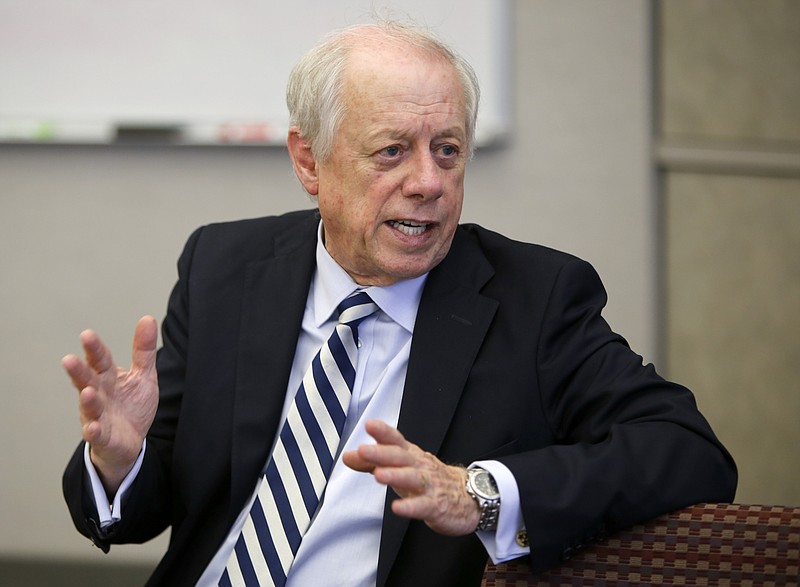When you're a Democrat running for the United States Senate in a state in which President Donald Trump is popular, you bite your tongue and say things you ordinarily wouldn't in hopes voters will overlook who you are and vote for you anyway.
Sen. Joe Manchin, D-W.Va., is the latest to pander to his state's electorate. In an interview with Politico published Wednesday, he said he regrets backing Hillary Clinton for president in 2016 and left the door open for supporting Trump for re-election in 2020.
"It (endorsing her) was a mistake," he said. "It was a mistake politically."
The problem, Manchin said, is that the former secretary of state came to West Virginia and promised the moon. The goodies she held out included highways for devastated parts of the state, broadband internet and a hydroelectric dam.
How could he say no?
"Is this about me?" Manchin lamely asked in the interview. "Or trying to help a part of my state that's never recovered and is having a tough time."
By now, West Virginia voters should know this is what Democrats do. Oblivious of the cost of things, they promise and promise and promise. A few of the promises may get filled; most won't, though, because the party's unspoken far left agenda needs fulfilling first.
Manchin, one of the most vulnerable Democratic senators in a state Trump won by more than 40 points, said in 2020 he'd be "open to supporting the person who I think is best for my country and my state. If his (Trump's) policies are best, I'll be right there."
But where was he on tax reform, Obamacare replacement bills, and the confirmation of Education Secretary Betsy DeVos and Health and Human Services Secretary Tom Price? Right where Minority Leader Chuck Schumer, D-N.Y., wanted him to be.
If Manchin's words sound familiar, that's because several other Democratic senators up for re-election in pro-Trump states also have said them.
Sen. Joe Donnelly, D-Ind., for instance, revealed to Politico that he'd told Trump when the president invited him to share a ride back to Indiana on Air Force One: "And the other thing is this, Mr. President: We share the same views on a lot of subjects."
Later, he tried to stress his independence to the online site.
"I work for Hoosiers, not President Trump or any political party," Donnelly said.
But when Schumer came knocking, he voted for Supreme Court nominee Neil Gorsuch but against tax reform and against seven of the president's Cabinet nominees.
Sen. Heidi Heitkamp, D-N.D., has walked a similar tightrope.
"When I agree with the president, I vote with him - and that's over half my votes," she said in a commercial that began airing last month. "And if his policies hurt North Dakota, he knows I'll speak up. ... I only answer to you [voters]."
Heitkamp voted for a recent banking deregulation bill that Trump wanted and the confirmations of Gorsuch, CIA Director Gina Haspel and Secretary of State Mike Pompeo, but she opposed the tax bill and the repeal of Obamacare.
Here in Tennessee, former Democratic Gov. Phil Bredesen is also attempting the balancing act.
In a television ad to convince conservative Volunteer State residents that his sound governorship could translate to an independent-thinking term in the Senate, he said he was not running against Trump but to represent the state.
"I learned a long time ago to separate the message from the messenger," Bredesen said. "There's a lot of things I don't personally like about Donald Trump, but he's the president of the United States, and if he has an idea and is pushing some things that I think are good for the people of Tennessee, I'm going be for it. It doesn't matter where it came from."
Unfortunately, that's not the way it works in highly partisan Washington, D.C. In critical matters, if you're a Democrat, you vote the way Schumer tells you to vote or you find yourself locked out of plum assignments.
Besides, Bredesen's financial disclosure forms indicate he's become more partisan in recent years, not more independent.
Of the dozens of congressional, Senate and presidential campaigns he's favored since 1983, several stand out, according to a Washington Examiner accounting by Philip Wegmann.
President Bill Clinton's campaign and leadership committees got $4,000 from him, and former Vice President Al Gore's presidential campaigns scored a total of $9,000. But, out of office and free to be the "independent leader" his spokeswoman says Bredesen is, he gave $5,000 to President Barack Obama's 2012 presidential campaign and $30,000 to his affiliated victory fund, then gave Hillary Clinton $2,700 to her election fund and $33,400 to her victory fund.
The former governor has the absolutely right strategy to try to convince voters of his independence in a state won by Trump by 26 points, but we think that real lack of independence will be increasingly exposed to voters in the fall campaign.
